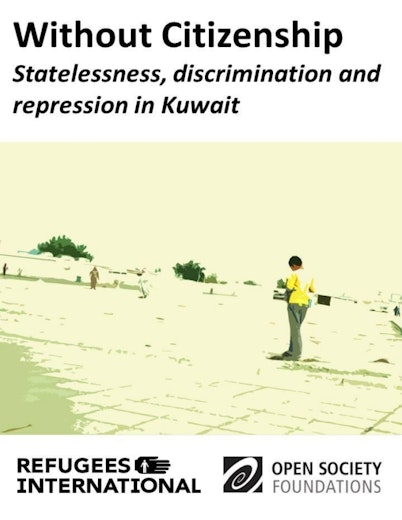Without Citizenship: Statelessness, Discrimination, and Repression in Kuwait
This report by the Open Society Justice Initiative and Refugees International looks at the bidoon in Kuwait—a large population of stateless persons in the small emirate—as well as other citizenship–related issues. The report outlines the history of the bidoon issue in Kuwait and their current situation. It discusses the relevant legal framework, with particular focus on discrimination in access to, and withdrawal of, nationality. It also analyzes Kuwait’s international obligations in the areas of nationality and statelessness, and offers policy recommendations.
”Bidoon” means “without” in Arabic, indicating that this group—estimated to range between 90,000 and 180,000 people—lives without nationality of any state. While Kuwaiti nationals enjoy a large number benefits and subsidies, stateless people in this small but very wealthy country live in slum-like settlements on the outskirts of its cities, where they suffer numerous human rights violations.
The bidoon issue had already begun at the time of independence, when Kuwait went through a process of defining who would be a citizen of the emirate and who would not. Unfortunate circumstances led many tens of thousands to a life in limbo. In the 1980s the situation deteriorated for bidoon. Government policies changed, and they were increasingly viewed as “illegal residents.”
After decades of statelessness, discrimination, and abuse, bidoon demonstrations for nationality rights took place on February 18, 2011. Afraid of the protest spiraling out of control, the government quickly promised some meager reforms, including access to a few basic rights for bidoon. Still with no change in sight, on March 11 bidoon took to the streets again chanting that they love their country and their Emir, and that they want their rights. This time the government responded with excessive force, advancing with armored vehicles and riot police, employing tear gas and flares to break up crowds, then arbitrarily running after, beating, and detaining random people.
The basic rights and services promised by the government are without doubt important, but they will not effectively deal with the underlying problems of poverty, exclusions, and statelessness. The nationality issue must be addressed to ensure an adequate and fair resolution to this problem. Right now, tens of thousands of lives and enormous human capital and financial resources are being wasted. This senseless suffering was described by one young bidoon: "It is the humiliation of not being given what is a right everywhere in the world."
Topics
- Climate Justice
- Digital Rights and Fair Elections
- Discrimination and Racial Justice
- International Crimes
